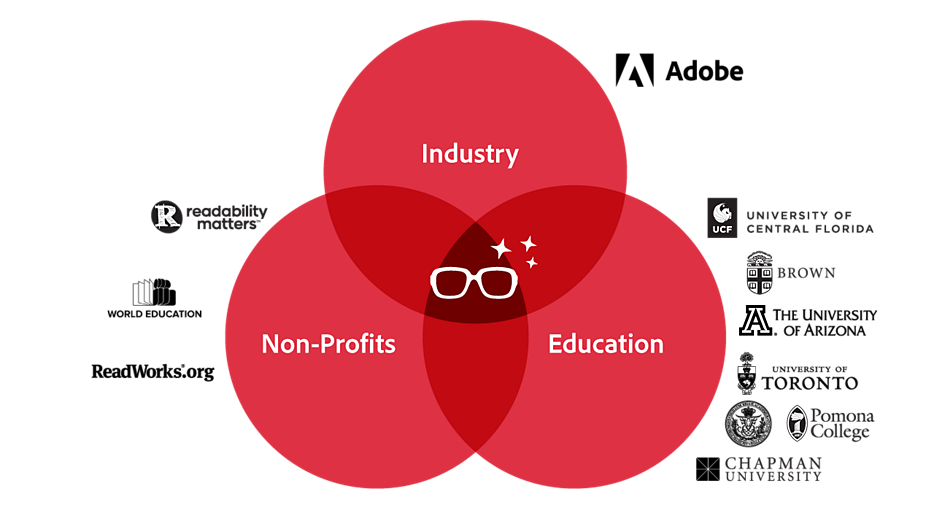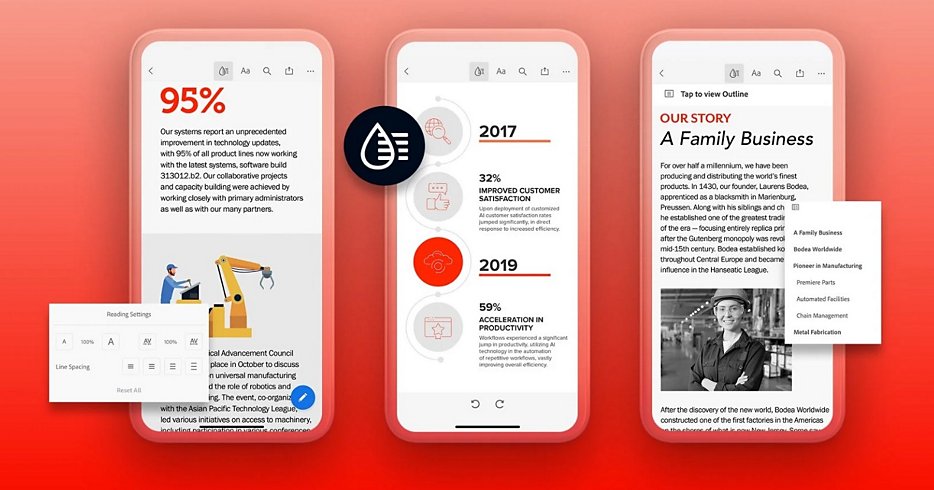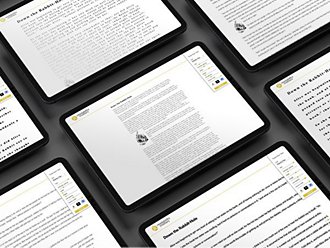Better reading for all.
We’re working with educators, non-profits and technologists to help people of all ages and abilities read better by personalising the reading experience on digital devices.
Fast Company World Changing Ideas Awards 2021: Finalist
Adobe Announces Readability Consortium with Google and University of Central Florida to Improve Reading for All.
54% of U.S. adults ages 16 to 74 years old (130 million people) lack proficiency in literacy, reading below a sixth-gradient level.
Source: U.S. Department of Education
Improving readability through personalisation.
Reading is foundational to acquiring knowledge and sharing ideas, but most children and adults worldwide don’t read at their optimum capacity. Technology can change this. New digital innovations (such as Liquid Mode in Adobe Acrobat Reader mobile) enable us to personalise reading to each reader and improve literacy for people of all skill levels.

Partnering with experts on research.
Adobe has invested years of research in using technology to improve the experience of reading digital documents. We’re partnering with higher education, reading experts, non-profits, educators and technologists to conduct research, run pilot programmes, and share our learnings.
NEWS: Adobe Announces Readability Consortium with Google and University of Central Florida to Improve Reading for All
Learn more about The Readability Consortium
Product innovations for digital reading.
Adobe is using learnings from the Readability Initiative to reinvent how people read and extract information from digital documents. We took our first step with Liquid Mode, a tool in the free Adobe Acrobat Reader app that lets you effortlessly read documents on mobile devices. Liquid Mode uses Adobe Sensei AI and machine learning technology to understand the structure of PDFs, enhance readability, and unleash on-the-go productivity.


Read the latest research
Review the newest findings from Adobe and our partner researchers studying the effects of reading formats and technology on reading outcomes for all learners.

Find your best reading style
Take our quiz in the Virtual Readability Lab to discover your fastest font, best spacing and favourite font for reading and participate in more reading studies.

Pilot in classrooms
We’re looking for K-12 and higher education institutions, curriculum developers and education companies to pilot readability tools in real-world situations and share their findings.
Join us in making reading better for everyone.
Watch recent talks on Readability.
New Directions in Readability and Accessibility" session at Adobe MAX 2022
Learn more
“Creating Value with Personalised Readability Formats” session at the Adobe MAX 2021
“One Font Doesn’t Fit All: Type Design and Comprehension” session at the Adobe MAX 2021
“Personalising Reading: One Size Doesn’t Fit All” session at the 2021 SXSW EDU
THERIF: Themes for Readability from Iterative Feedback (ACM CHI EA, 2023)
Tianyuan Cai, Aleena Gertrudes Niklaus, Bernard Kerr, Michael Kraley, Zoya Bylinskii
This paper introduces a set of three digital reading themes - Compact, Open and Relaxed - differing in font, as well as character, word and line spacing. Our research shows that personalising reading themes can benefit readers with different needs, when tested with readers of different ages and with different levels of dyslexia. These recommended themes emerge from combining crowdsourcing experiments with hundreds of participants, design sessions and machine learning over multiple iterations.
Digital Reading Rulers: Evaluating Inclusively Designed Rulers for Readers With Dyslexia and Without (ACM CHI, 2023)
Aleena Gertrudes Niklaus, Tianyuan Cai, Zoya Bylinskii, Shaun Wallace
This paper follows inclusive design principles to arrive at four different digital reading ruler designs. Inspired by physical reading rulers (or dyslexia rulers) that are used to help readers keep their place on a line of text, our digital versions allow readers to make their way through digital documents. Our research shows that many readers prefer these simple interventions and that readers with dyslexia experience speed benefits when reading with our digital reading rulers.
Web Table Formatting Affects Readability on Mobile Devices (ACM WWW, 2023)
Christopher Tensmeyer, Zoya Bylinskii, Tianyuan Cai, Dave Miller, Ani Nenkova, Aleena Niklaus, Shaun Wallace
This paper presents the results of crowdsourced studies to understand how to design tables to be faster and more satisfying to read on mobile devices. After having crowdworkers complete information lookup and comparison tasks using differently formatted tables, we found that smaller cell padding leads to faster reading, row and column separators increase participant satisfaction and frozen headers for large tables improve both user experience and task completion speed.
Readability Research: An Interdisciplinary Approach (Foundations and Trends in Human Computer Interaction, 2022)
Sofie Beier, Sam Berlow, Esat Boucaud, Zoya Bylinskii, Tianyuan Cai and others
This long-form journal paper is both a survey and a guide to running readability studies. We discuss the components that come together to form reading experiments, including typographic considerations, reading populations, experimental hardware (including eye trackers and brain imagining tech), metrics (speed, comprehension, preference etc.) and analysis techniques. Authors of this paper include typographers, educators, vision scientists, neuroscientists and computer scientists.
Personalised Font Recommendations: Combining ML and Typographic Guidelines to Optimise Readability (ACM DIS, 2022)
Tianyuan Cai, Shaun Wallace, Tina Rezvanian, Jonathan Dobres, Bernard Kerr, Samuel Berlow, Jeff Huang, Ben D. Sawyer, Zoya Bylinskii
This paper presents FontMART, a font recommender capable of making personalised recommendations for faster fonts to read with. In a study conducted with 252 crowdworkers, we found that the font recommendation from FontMART helped readers speed up by 14-25 words per minute, without hindering comprehension. This encouraging evidence provides motivation for adding our personalised font recommendation to future user interfaces.
Towards Individuated Reading Experiences: Different Fonts Increase Reading Speed for Different Individuals (ACM TOCHI, 2022)
Shaun Wallace, Zoya Bylinskii, Jonathan Dobres, Bernard Kerr, Sam Berlow, Rick Treitman, Nirmal Kumawat, Kathleen Arpin, Jeff Huang, Ben Sawyer
This journal paper presents a large-scale crowdsourced reading study that compares the readability of 16 different fonts. Readers were able to read 35% faster in their best fonts compared to their worst fonts and which font was best depended on the individual reader, pointing to the need to customise font choices for different readers.
Improving Reading Outcomes for Readers with and Without Dyslexia (Journal of Vision V-VSS, 2021)
Aleena Niklaus, Shaun Wallace
This abstract, presented as a poster at the Vision Sciences Society Annual Meeting, demonstrated the reading benefits of using a digital reading ruler, for dyslexic readers and the general population more broadly. Three different digital reading rulers were investigated, showing that different readers benefit from different reading ruler designs.
Accelerating Adult Readers with Typeface: A Study of Individual Preferences and Effectiveness (ACM CHI LBW, 2020)
Shaun Wallace, Ben Sawyer, Rick Treitman, Zoya Bylinskii, Jeff Huang
This short paper presents the design of a reading test for remote, online research studies to investigate the effects of typeface on preference, reading speed and comprehension. The first of our studies, this work presented evidence that one font does not fit all and that fonts people like are different from the ones they are fastest reading in.
Our partners

The Virtual Readability Lab at University of Central Florida
Dr Ben Sawyer is a leading researcher in computer-machine interaction who’s established a lab at UCF for state-of-the-art research in digital/electronic reading. Adobe is sponsoring the Virtual Readability Lab and collaborating with Dr Sawyer and his team on multiple digital reading research studies.

By engaging an ecosystem of partners like Adobe, Readability Matters aims to make individual reading formats ubiquitous across devices and platforms.

Dedicated to improving the lives of the poor through education and social and economic development programmes, World Education plans to pilot Adobe tools in adult education settings and share their findings.